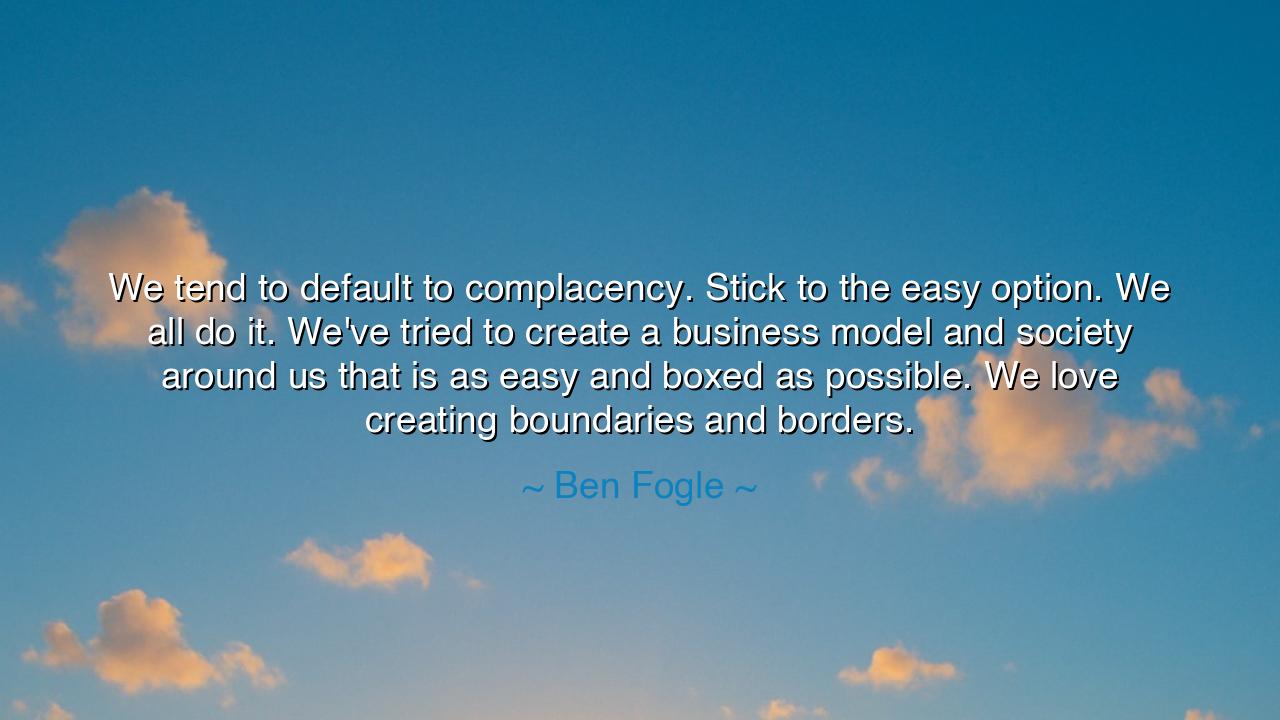
We tend to default to complacency. Stick to the easy option. We
We tend to default to complacency. Stick to the easy option. We all do it. We've tried to create a business model and society around us that is as easy and boxed as possible. We love creating boundaries and borders.






Ben Fogle’s words strike at the quiet weakness of the human heart: “We tend to default to complacency. Stick to the easy option. We all do it. We've tried to create a business model and society around us that is as easy and boxed as possible. We love creating boundaries and borders.” Here, he does not condemn humanity, but he warns us. He shows us a mirror in which we see ourselves choosing the path of least resistance, building lives and systems not upon courage, but upon comfort. To choose ease over challenge may seem harmless, yet over time it forges chains, binding us within invisible walls of our own design.
In the days of old, the philosophers and poets knew this danger well. They taught that man was not created for endless ease, but for struggle and striving. The Greeks told of Odysseus, who did not find greatness by resting in his homeland but by venturing into storms and facing trials that seemed impossible. His story was not boxed, nor bounded by comfort, but carved in the chaos of risk. So too, Fogle’s warning reminds us that a society built only on what is easy becomes stagnant, for growth is born of hardship, not of complacency.
Consider the history of the Age of Discovery, when sailors cast off from the shores of Europe to face unknown seas. They might have stayed within the borders of their small kingdoms, safe and secure. But their daring opened new worlds, expanded human understanding, and changed history forever. Yet, alongside these triumphs, we must remember the dangers: when borders are drawn not to protect, but to confine, they can strangle the very spirit they were meant to serve. Thus, the lesson is double-edged: boundaries can guide, but when worshipped, they become prisons.
Fogle speaks also of the business model, the desire to package life into predictable patterns. We surround ourselves with routines, technologies, and comforts that shield us from the unknown. And while these gifts make life bearable, they also dull the fire of adventure within the human spirit. The ancients would remind us that man is not made for cages, even golden ones. When we hide too long within them, the wings of our courage wither, and we forget that we were meant to fly.
The danger of complacency is not only personal but collective. A society that clings too tightly to the easy option loses its ability to adapt, to face storms when they come. History shows this in the fall of mighty Rome, when luxury replaced discipline and complacency dulled the once-sharp edge of its people. The barbarians at the gates were not the sole cause of its fall; it was the empire’s surrender to ease, the belief that borders alone would protect them, that led to its ruin.
What, then, must we learn from Fogle’s words? That comfort is not evil, but it must never become our master. That borders and systems should serve us, not imprison us. That each person, in their own life, must choose at times the harder path—the risk, the adventure, the struggle—for in these moments, character is forged, and life regains its spark. The wise do not seek constant struggle, but they do not fear it either. They welcome it as the forge that tempers the soul.
Therefore, let each listener take this practical counsel: Do not always choose the easy option. Challenge yourself to step beyond your boundaries, to cross the borders of habit and comfort. Seek a new skill, face a fear, embrace the unknown. And in your community, do not allow systems of complacency to dictate your future. Support those who dare to question, who dare to dream beyond the box. In this way, you will keep alive the spirit of adventure that has carried humanity from the caves to the stars.
So let Fogle’s words endure as a call to arms against stagnation: “We tend to default to complacency… We love creating boundaries and borders.” Yes, we do. But we must not love them so much that we forget the wild freedom beyond them. For only by stepping outside the box can we truly live, and only by daring the difficult path can a society remain alive, resilient, and free.






AAdministratorAdministrator
Welcome, honored guests. Please leave a comment, we will respond soon